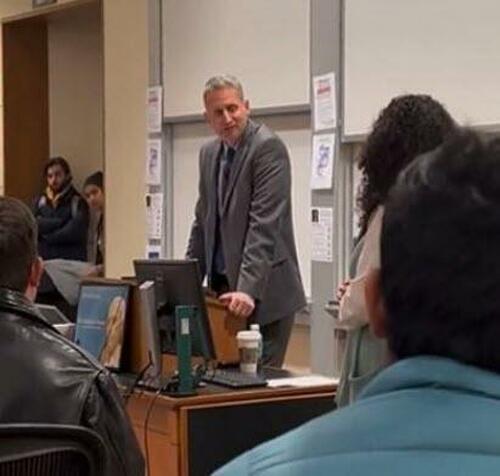
Authored by Samantha Swenson via The College Fix,
More than one third of Stanford University students say using physical violence to stop a speech is acceptable in at least some circumstances, according to a new report.
The Foundation for Individual Rights and Expression conducted the survey after federal Judge Kyle Duncan’s speech on campus was shouted down last year. The report evaluated students’ perspectives about free speech on campus and protests in the aftermath of the event.
FIRE Chief Research Advisor Sean Stevens told The College Fix the research found “considerably higher” support for canceling a speaker among Stanford students when compared to their peers nationwide.
The survey found 54 percent of Stanford students believed Duncan’s speech to the law school’s Federalist Society chapter should have been canceled by the administration. Additionally, 75 percent said shouting down a speaker to prevent them from speaking was acceptable in some circumstances.
Meanwhile, 36 percent said the same about using physical violence to stop a speech, the report found.
Since the incident last year, “the percentage of conservative students who expressed comfort expressing their views on a controversial political topic in the classroom or on social media dropped precipitously, so did the percentage of conservative students who expressed comfort disagreeing with their professor on a controversial political topic both publicly and privately,” Stevens said.
An earlier survey found 45 percent of conservative students were comfortable publicly disagreeing with a professor, but this dropped to 6 percent following the disruption of Duncan’s speech, according to FIRE’s report.
“This indicates that the shout down has made it clear to a portion of students that certain viewpoints are not welcome at Stanford,” Stevens told The Fix.
Stevens said FIRE has been “encouraged by how Stanford has responded to the Judge Duncan shout down.”
“But, we also think recent trends nationwide in campus deplatforming attempts are very concerning, and do not think Stanford — even with their new found respect for the First Amendment — will be immune to further attempts to deplatform speakers,” he said.
Further, Stevens said, “It doesn’t matter if the speaker is on the left or the right, a freshman or a federal judge. Incidents like the Judge Duncan shout down aren’t isolated affairs, but symptoms of a larger problem with campus free speech culture.”
The Fix emailed Stanford University twice in the past two weeks, asking about the survey, its safety precautions for speakers, and its outlook on free speech on campus. It did not respond.
Stanford Law School’s Federalist Society, which hosted the event with Duncan, also did not respond to two email requests for comment in the past two weeks asking about the survey and the free speech atmosphere on campus.
Shouting down speakers has become a problem at universities in recent years. A similar incident took place at Yale Law School in 2022 when protesters disrupted a Federalist Society event with Alliance Defending Freedom attorney Kristen Waggoner, who students alleged put queer students “at risk of harm.”
This spring, protesters also disrupted Republican Rep. Mike Collins’ speech at the University of Georgia and Democrat Rep. Jamie Raskin’s talk at the University of Maryland, with some criticizing the lawmakers’ actions on the Israel-Hamas conflict.
Authored by Samantha Swenson via The College Fix,
More than one third of Stanford University students say using physical violence to stop a speech is acceptable in at least some circumstances, according to a new report.
The Foundation for Individual Rights and Expression conducted the survey after federal Judge Kyle Duncan’s speech on campus was shouted down last year. The report evaluated students’ perspectives about free speech on campus and protests in the aftermath of the event.
FIRE Chief Research Advisor Sean Stevens told The College Fix the research found “considerably higher” support for canceling a speaker among Stanford students when compared to their peers nationwide.
The survey found 54 percent of Stanford students believed Duncan’s speech to the law school’s Federalist Society chapter should have been canceled by the administration. Additionally, 75 percent said shouting down a speaker to prevent them from speaking was acceptable in some circumstances.
Meanwhile, 36 percent said the same about using physical violence to stop a speech, the report found.
Since the incident last year, “the percentage of conservative students who expressed comfort expressing their views on a controversial political topic in the classroom or on social media dropped precipitously, so did the percentage of conservative students who expressed comfort disagreeing with their professor on a controversial political topic both publicly and privately,” Stevens said.
An earlier survey found 45 percent of conservative students were comfortable publicly disagreeing with a professor, but this dropped to 6 percent following the disruption of Duncan’s speech, according to FIRE’s report.
“This indicates that the shout down has made it clear to a portion of students that certain viewpoints are not welcome at Stanford,” Stevens told The Fix.
Stevens said FIRE has been “encouraged by how Stanford has responded to the Judge Duncan shout down.”
“But, we also think recent trends nationwide in campus deplatforming attempts are very concerning, and do not think Stanford — even with their new found respect for the First Amendment — will be immune to further attempts to deplatform speakers,” he said.
Further, Stevens said, “It doesn’t matter if the speaker is on the left or the right, a freshman or a federal judge. Incidents like the Judge Duncan shout down aren’t isolated affairs, but symptoms of a larger problem with campus free speech culture.”
The Fix emailed Stanford University twice in the past two weeks, asking about the survey, its safety precautions for speakers, and its outlook on free speech on campus. It did not respond.
Stanford Law School’s Federalist Society, which hosted the event with Duncan, also did not respond to two email requests for comment in the past two weeks asking about the survey and the free speech atmosphere on campus.
Shouting down speakers has become a problem at universities in recent years. A similar incident took place at Yale Law School in 2022 when protesters disrupted a Federalist Society event with Alliance Defending Freedom attorney Kristen Waggoner, who students alleged put queer students “at risk of harm.”
This spring, protesters also disrupted Republican Rep. Mike Collins’ speech at the University of Georgia and Democrat Rep. Jamie Raskin’s talk at the University of Maryland, with some criticizing the lawmakers’ actions on the Israel-Hamas conflict.
Loading…





